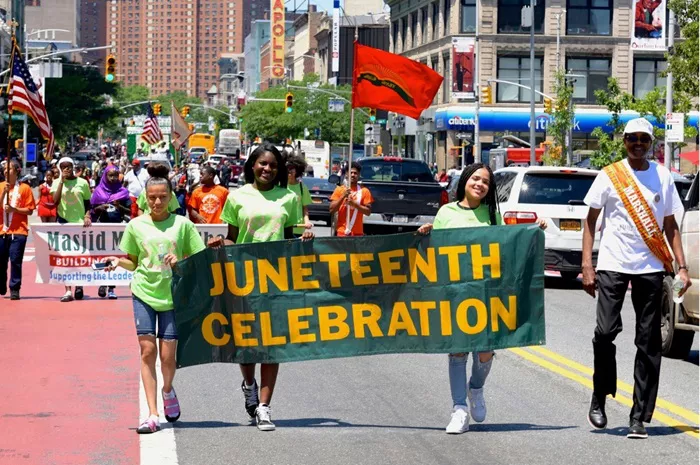This week, Americans across the country will commemorate Juneteenth, a holiday that marks the end of slavery in the United States. Officially recognized as a federal holiday in 2021, Juneteenth has deep historical roots and continues to evolve in both its celebration and cultural significance.
The holiday dates back to June 19, 1865, when Union troops arrived in Galveston, Texas, and informed enslaved African Americans that they were free—more than two years after President Abraham Lincoln had issued the Emancipation Proclamation.
Juneteenth, a blend of “June” and “nineteenth,” has long been celebrated in Black communities. Today, it is observed across the country with a mix of reflection, education, and festivity.
A Changing Political Landscape
This year marks the first Juneteenth under President Donald Trump’s second administration, which has eliminated federal diversity, equity, and inclusion (DEI) initiatives. These changes have included the removal of some Black history content from government websites and the discouragement of federal agencies from observing cultural heritage events.
Despite the federal recognition of Juneteenth, the political climate has raised questions for some about whether their employers will honor the holiday.
“I don’t think anyone should be intimidated or obligated into not celebrating the day,” said Marc Morial, president and CEO of the National Urban League. “I’ve not heard of anyone being denied. I think it would be absolutely reprehensible.”
A Day of Celebration or Reflection?
How people observe Juneteenth varies widely. In many communities, celebrations are rooted in cookouts, parades, and festivals. These gatherings harken back to the early days of Juneteenth, when newly freed families would reunite in open-air celebrations, free from the restrictive “Black Codes” that once governed their lives.
Others choose to mark the day with quieter forms of observance, such as volunteering, attending educational events, or spending time in reflection.
“The most important thing everyone should do is be able to quickly answer the question, ‘What is Juneteenth?’” Morial added.
Learning the History
Dr. David Anderson, a pastor and CEO of Gracism Global, said he never learned about Juneteenth growing up and didn’t celebrate it until his 30s.
“Even if you heard about it and knew about it, you didn’t celebrate it,” Anderson said. “It was like just a part of history. It wasn’t a celebration of history.”
For many African Americans, especially those who grew up outside of Texas, Juneteenth was not widely observed. In the South, celebrations often correspond to the date emancipation was announced in that particular state.
Events Across the Country
Juneteenth events this year range in size and tone. Some communities host large festivals featuring music, food trucks, art vendors, and parades. Many events also include informational booths on health, finance, and community services, as well as panels focused on history and racial justice.
The National Park Service will again waive entrance fees at all sites in honor of the holiday.
Symbols, Flags, and Food
Symbols of Juneteenth include the Pan-African flag—red, black, and green—which has long been associated with Black liberation. Increasingly, however, many are embracing the Juneteenth flag created in 1997 by Ben Haith. It features red, white, and blue to emphasize that freed African Americans were and are Americans. A five-point star in the center represents Texas, surrounded by a bursting outline symbolizing new freedom across the country.
Red foods are also traditional. Barbecue, red meats, red velvet cake, watermelon, and red drinks such as fruit punch or Kool-Aid often make their way onto Juneteenth tables, symbolizing both bloodshed and cultural endurance.
Commercialization and Community Support
In recent years, major retailers have sold Juneteenth-themed merchandise. However, some companies appear to be pulling back amid growing political scrutiny. Morial sees this as a moment for consumers to be intentional.
“I would also encourage people to go online and look for an African American vendor,” he said. “If you’re going to participate in the commercial side, that’s what I would do.”
Who Can Celebrate?
Dr. Karida Brown, a sociology professor at Emory University, encourages non-Black Americans to embrace the holiday.
“It absolutely is your history. It absolutely is a part of your experience,” Brown said. “The story of emancipation and freedom for your Black brothers and sisters under the Constitution is part of our collective narrative.”
Alternative Names and Greetings
Juneteenth is also known by other names such as Freedom Day, Emancipation Day, Black Independence Day, and the Second Independence Day. Brown noted the contrast with July 4th, pointing out that while the United States declared its independence in 1776, Black Americans remained enslaved.
“Fourth of July always comes with a bittersweet tinge to it,” she said.
As for greetings, wishing someone a “Happy Juneteenth” or “Happy Teenth” is common, much like exchanging holiday cheer at Christmas.
“You can get a ‘Merry Christmas’ from everybody,” said comedian Alan Freeman, who is hosting a Juneteenth-themed comedy show in Galveston. “This is the same way.”

